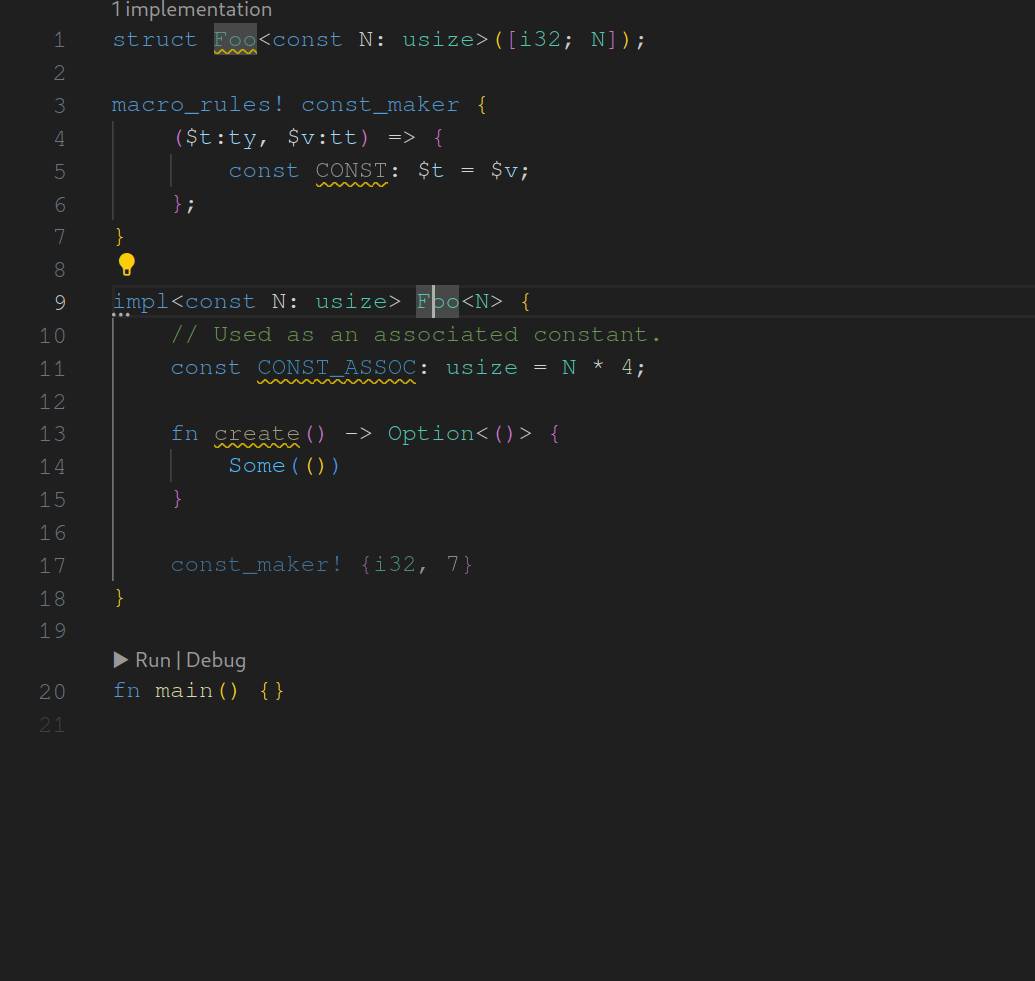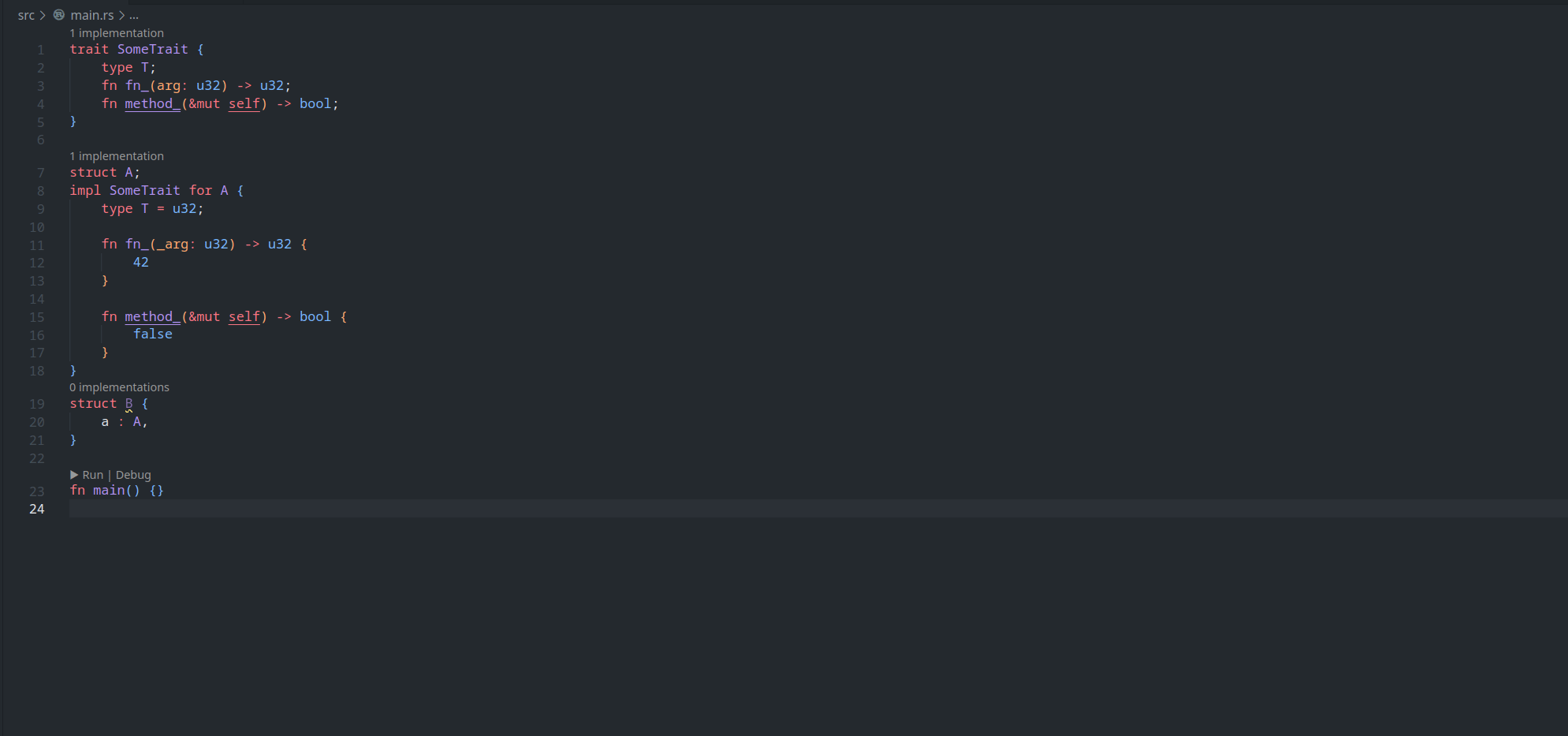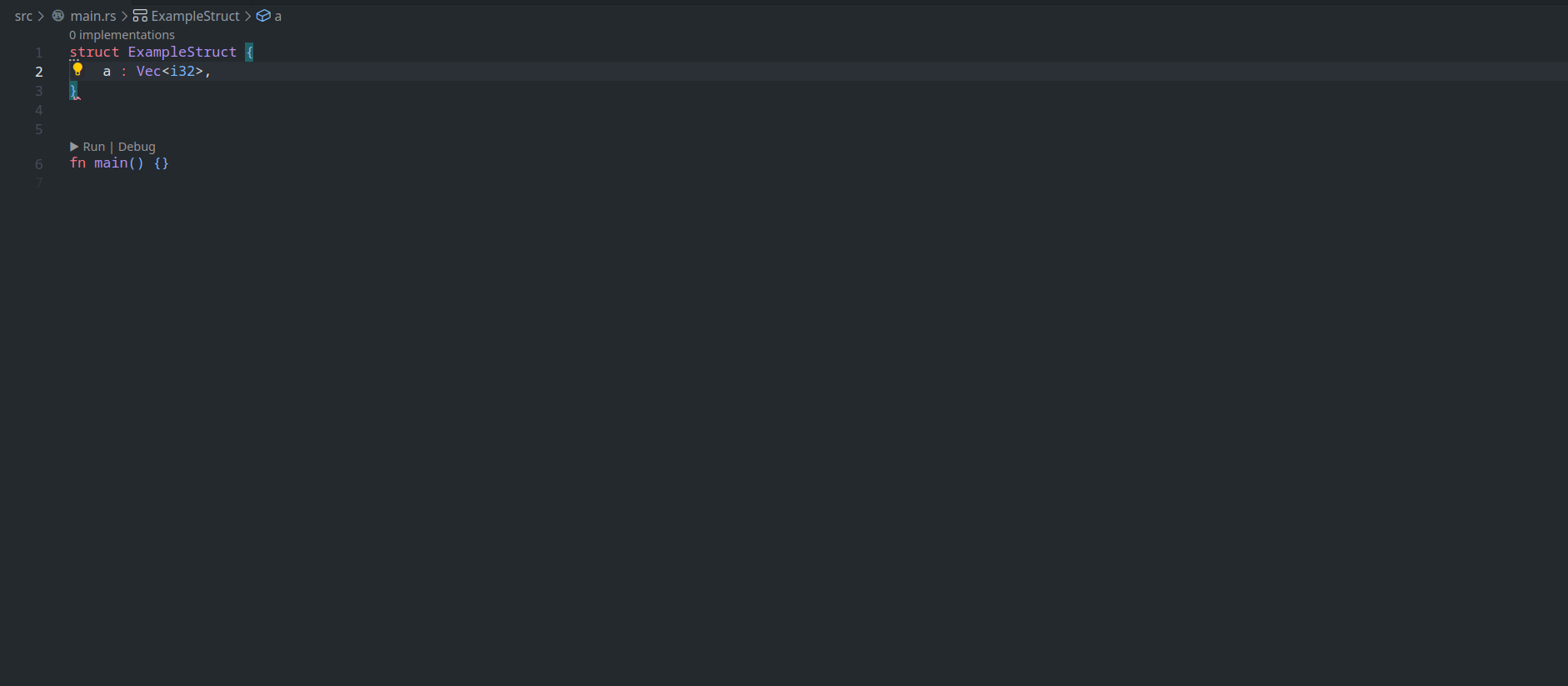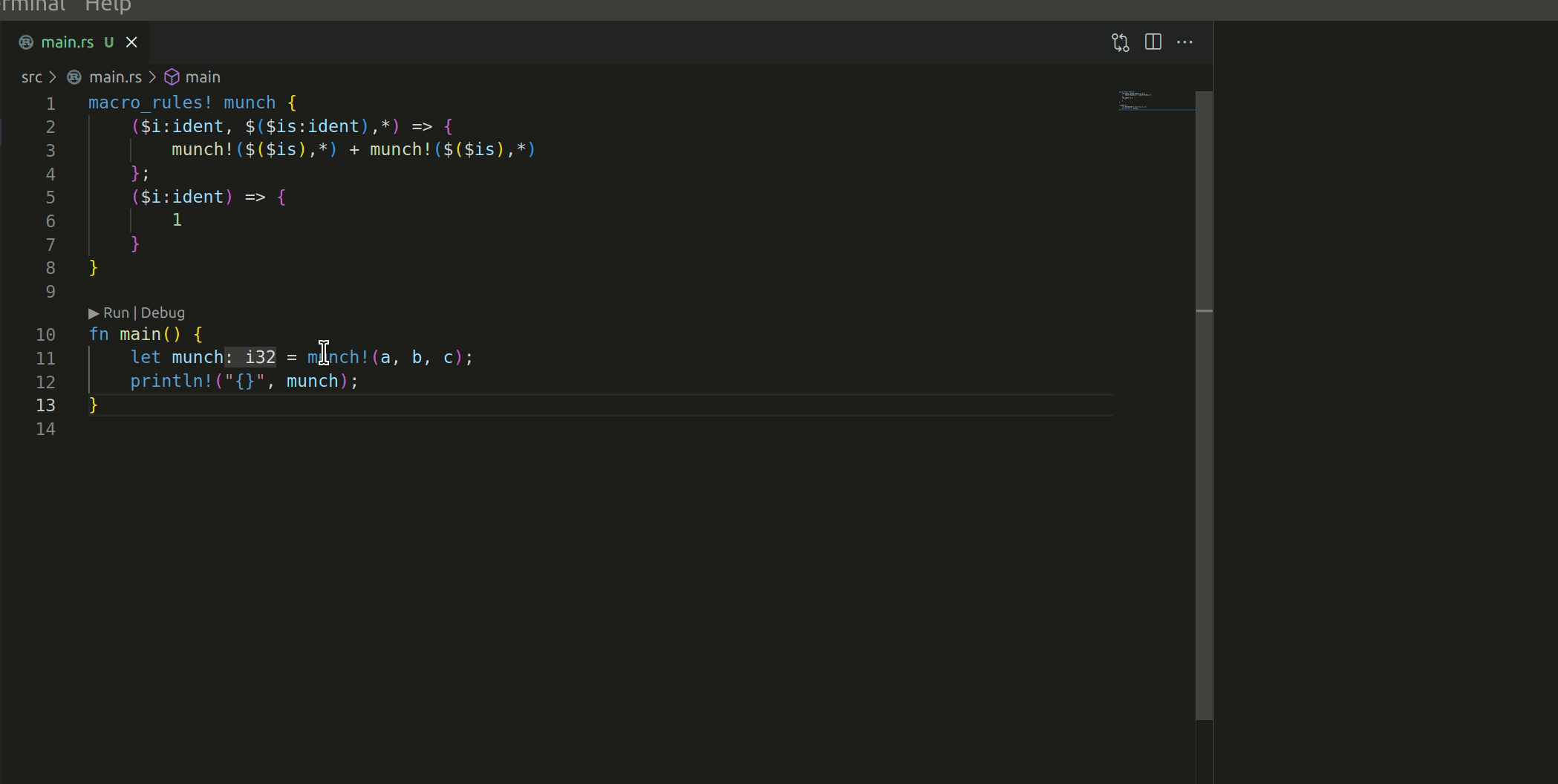Add ExternCrateDecl to HIR
Adding these doesn't really require much design effort as they represent a single import, unlike use trees which are one item that represent 0 or more imports.
We only resolve to this definition when actually resolving on the name or alias of an `extern crate name as alias` item, not usages yet as that requires far more changes that won't lead anywhere without giving it more thought. Nevertheless the changes slightly improve IDE things, an example being hover on the decl showing the merged doc comments for example.
cc https://github.com/rust-lang/rust-analyzer/issues/14079
Added remove unused imports assist
This resolves the most important part of #5131. I needed to make a couple of cosmetic changes to the search infrastructure to do this.
A few open questions:
* Should imports that don't resolve to anything be considered unused? I figured probably not, but it would be a trivial change to make if we want it.
* Is there a cleaner way to make the edits to the use list?
* Is there a cleaner way to get the list of uses that intersect the current selection?
* Is the performance acceptable? When testing this on itself, it takes a good couple seconds to perform the assist.
* Is there a way to hide the rustc diagnostics that overlap with this functionality?
internal: Defer structured snippet rendering to allow escaping snippet bits
Since we know exactly where snippets are, we can transparently escape snippet bits to the exact text edits that need it, and not have to do it for anything other text edits.
Also will eventually fix#11006 once all assists are migrated. This comes as a side-effect of text edits that don't have snippets get marked as having no insert formatting at all.
Don't provide `add_missing_match_arms` assist when upmapping match arm list failed
Fixes#15310
We shouldn't provide the assist when we fail to find the original match arm list.
Note that this PR will temporarily make the assist not applicable when attribute macro operates on the match expression in question, just like the case in #15310, for most of the current stable toolchain users. This is because the sysroot-abi proc-macro-srv on the current stable [discards] spans for `Group` delimiters in some code paths, which the popular `proc-macro2` crate almost always calls, and it makes the identity of match arm list's brackets lost, leading to the upmapping failure. This has been fixed by #14960, which will land in the next stable, 1.71.
[discards]: 8ede3aae28/src/tools/rust-analyzer/crates/proc-macro-srv/src/abis/abi_sysroot/ra_server.rs (L231)
bugfix : skip doc(hidden) default members
fixes #14957 . I have two questions :
1. I am definitely looking for a more idiomatic way for the things I added in `crates/ide-assists/src/utils.rs`. See `FIXME` in that file.
2. Would it be actually better to change `DefaultMethods` to something like
```rust
enum DefaultMethods {
Only( IgnoreHidden ( bool ) ) ,
None
}
```
instead of adding a boolean to every function that calls `crates/ide-assists/src/utils.rs::filter_assoc_items`
internal: Migrate assists to the structured snippet API, part 3
Continuing from #15231
Migrates the following assists:
- `add_missing_match_arms`
- `fix_visibility`
- `promote_local_to_const`
The `add_missing_match_arms` changes are best reviewed commit-by-commit since they're relatively big changes compared to the rest of the commits.
`clone_for_update` is relatively cheap in comparison, since making a
node require parsing an entire source text
Adds a test to make sure that it doesn't crash when multiple uses are
present.
internal: Migrate more assists to use the structured snippet API
Continuing from #14979
Migrates the following assists:
- `generate_derive`
- `wrap_return_type_in_result`
- `generate_delegate_methods`
As a bonus, `generate_delegate_methods` now generates the function and impl block at the correct indentation 🎉.
`does_not_fill_wildcard_with_wildcard`
and `does_not_fill_wildcard_with_partial_wildcard_and_wildcard`
both made no modifications to the code,
which is a problem for mutable ast porting as it generates a best-effort
minimal set of text edits,
and assists require at least one text edit.
# Overview
Extracting a match arm value that has type unit into a function, when a
comma already follows the match arm value, results in an invalid (syntax
error) semicolon added between the newly generated function's generated
call and the comma.
# Example
Running this extraction
```rust
fn main() {
match () {
_ => $0()$0,
};
}
```
would lead to
```rust
fn main() {
match () {
_ => fun_name();,
};
}
fn fun_name() {
}
```
# Issue / Fix details
This happens because when there is no comma, rust-analyzer would simply
add the comma and wouldn't even try to evaluate whether it needs to add
a semicolon. But when the comma is there, it proceeds to evaluate
whether it needs to add a semicolon and it looks like the evaluation
logic erroneously ignores the possibility that we're in a match arm.
IIUC it never makes sense to add a semicolon when we're extracting from
a match arm value, so I've adjusted the logic to always decide against
adding a semicolon when we're in a match arm
Can actually split out adding the functions from getting the impl to
update or create thanks to being able to refer to the impl ast node.
FIXME Context:
Unfortunately we can't adjust the indentation of the newly added function
inside of `ast::AssocItemList::add_item` since for some reason the `todo!()`
placeholder generated by `add_missing_impl_members` and
`replace_derive_with_manual_impl` gets indented weirdly.
Unify getter and setter assists
This PR combines what previously have been two different files into a single file. I want to talk about the reasons why I did this. The issue that prompted this PR ( and before I forget : this pr fixes#15080 ) mentions an interesting behavior. We combine these two assists into an assist group and the order in which the assists are listed in this group changes depending on the text range of the selected area. The reason for that is that VSCode prioritizes actions that have a bigger impact in a smaller area and until now generate setter assist was only possible to be invoked for a single field whereas you could generate multiple getters for the getter assist. So I used the latter's infra to make former applicable to multiple fields, hence the unification. So this PR solves in essence
1. Make `generate setter` applicable to multiple fields
2. Provide a consistent order of the said assists in listing.
assist : generate trait from impl
fixes#14987 . As the name suggests this assist is used to generate traits from inherent impls while adapting the original impl to fit to the newly generated trait. I made some decisions regarding when the assist should be applicable. These are surely open to discussion. I looking forward to any feedback.

internal: Format let-else
As nightly finally got support for it I went ahead and formatted r-a with the latest nightly, then with the latest stable (in case other stuff changed)
Clean up `ImportMap`
There are several things in `hir_def::import_map` that are never used. This PR removes them and restructures the code. Namely:
- Removes `Query::name_only`, because it's *always* true.
- Because of this, we never took advantage of storing items' full path. This PR removes `ImportPath` and changes `ImportInfo` to only store items' name, which should reduce the memory consumption to some extent.
- Removes `SearchMode::Contains` for `Query` because it's never used.
- Merges `Query::assoc_items_only` and `Query::exclude_import_kinds` into `Query::assoc_mode`, because the latter is never used besides filtering associated items out.
Best reviewed one commit at a time. I made sure each commit passes full test suite. I can squash the first three commits if needed.
feature : assist delegate impl
This PR ( fixes#14386 ) introduces a new IDE assist that generates a trait impl for a struct that delegates a field. This is a draft because the current `ide_db::path_transform::PathTransform` produces some unwanted results when it deals with extern crates, an example of which I attach as a GIF.
GIFs :
1. A general case

2. A case where `ide_db::path_transform::PathTransform` fails to correctly resolve a property ( take `Allocator` as an example ) to its full path, thus causing an error to occur. ( Not to even mention that resolving this causes another error `use of unstable library feature 'allocator_api'` to occur

Remove scope_for_def calls as the definition have been removed entirely.
As a result of this change the problem with false path resolutions has been solved.
Lower const params with a bad id
cc #7434
This PR adds an `InTypeConstId` which is a `DefWithBodyId` and lower const generic parameters into bodies using it, and evaluate them with the mir interpreter. I think this is the last unimplemented const generic feature relative to rustc stable.
But there is a problem: The id used in the `InTypeConstId` is the raw `FileAstId`, which changes frequently. So these ids and their bodies will be invalidated very frequently, which is bad for incremental analysis.
Due this problem, I disabled lowering for local crates (in library crate the id is stable since files won't be changed). This might be overreacting (const generic expressions are usually small, maybe it would be better enabled with bad performance than disabled) but it makes motivation for doing it in the correct way, and it splits the potential panic and breakages that usually comes with const generic PRs in two steps.
Other than the id, I think (at least I hope) other parts are in the right direction.
fix: implemeted lifetime transformation fot assits
A part of https://github.com/rust-lang/rust-analyzer/issues/13363
I expect to implement transformation of const params in a separate PR
Other assists and a completion affected:
- `generate_function` currently just ignores lifetimes and, consequently, is not affected
- `inline_call` and `replace_derive_with...` don't seem to need lifetime transformation
- `trait_impl` (a completion) is fixed and tested
internal: Migrate some assists to use the structured snippet API
Migrates the following assists:
- `add_missing_impl_members`
- `extract_type_alias`
As an additional requirement, these assists are also migrated to use the mutable AST API, since otherwise there would be overlapping `Indel` spans
The change updates the logic to determine if a function parameter is
valid for replacing the type param with the trait implementation.
First all usages are determined, to check if they are used outside the function
parameter list. If an outside reference is found, e.g. in body, return type or
where clause, the assist is skipped. All remaining usages only appear in the
function param list. For each usage the param type is checked to see if
it's valid.
**Please note** the logic currently follows a heuristic and may not cover
all existing parameter declarations.
* determine valid usage references by checking ancestors (on AST level)
* split test into separate ones
Fix edits for `convert_named_struct_to_tuple_struct`
Two fixes:
- When replacing syntax nodes, macro files weren't taken into account. Edits were simply made for `node.syntax().text_range()`, which would be wrong range when `node` is inside a macro file.
- We do ancestor node traversal for every struct name reference to find record expressions/patterns to edit, but we didn't verify that expressions/patterns do actually refer to the struct we're operating on.
Best reviewed one commit at a time.
Fixes#13780Fixes#14927
Previously we didn't verify that record expressions/patterns that were
found did actually point to the struct we're operating on. Moreover,
when that record expressions/patterns had missing child nodes, we would
continue traversing their ancestor nodes.
This removes an existing generic param from the `GenericParamList`. It
also considers to remove the extra colon & whitespace to the previous
sibling.
* change order to get all param types first and mark them as mutable
before the first edit happens
* add helper function to remove a generic parameter
* fix test output
This adds a new assist named "replace named generic with impl" to move
the generic param type from the generic param list into the function
signature.
```rust
fn new<T: ToString>(input: T) -> Self {}
```
becomes
```rust
fn new(input: impl ToString) -> Self {}
```
The first step is to determine if the assist can be applied, there has
to be a match between generic trait param & function paramter types.
* replace function parameter type(s) with impl
* add new `impl_trait_type` function to generate the new trait bounds with `impl` keyword for use in the
function signature
fix: assists no longer break indentation
Fixes https://github.com/rust-lang/rust-analyzer/issues/14674
These are _ad hoc_ patches for a number of assists that can produce incorrectly indented code, namely:
- generate_derive
- add_missing_impl_members
- add_missing_default_members
Some general solution is required in future, as the same problem arises in many other assists, e.g.
- replace_derive_with...
- generate_default_from_enum...
- generate_default_from_new
- generate_delegate_methods
(the list is incomplete)
Restrict "sort items" assist for traits & impls
This restricts the "sort items alphabetically" assist when the selection is inside a `Impl` or `Trait` node & intersects with one of the associated items.
It re-orders the conditional checks of AST nodes in the `sort_items` function to check for more specific nodes first before checking `Trait` or `Impl` nodes. The `AssistContext` is passed into the `add_sort_methods_assist` function to check if the selection intersects with any inner items, e.g. associated const or type alias, function. In this case the assist does not apply.
Fixes: #14516
This fixes the applicability of the "sort items alphabetically" assist
when the selection is inside a `Trait` or `Impl`. It's now tested if the
selection is inside or overlaps with an inner node, e.g. associated
const or type alias, function.
minor: Fix some simple FIXMEs
Each FIXME fix has been split into its own commit, since they're all pretty independent changes.
(Forgot to open a PR for this a few days ago, oops)
internal: Implement Structured API for snippets
Fixes#11638 (including moving the cursor before the generated type parameter)
Adds `add_tabstop_{before,after}` for inserting tabstop snippets before & after nodes, and `add_placeholder_snippet` for wrapping nodes inside placeholder nodes.
Currently, the snippets are inserted into the syntax tree in `SourceChange::commit` so that snippet bits won't interfere with syntax lookups before completing a `SourceChange`.
It would be preferable if snippet rendering was deferred to after so that rendering can work directly with text ranges, but have left that for a future PR (it would also make it easier to finely specify which text edits have snippets in them).
Another possible snippet variation to support would be a group of placeholders (i.e. placeholders with the same tabstop number) so that a generated item and its uses can be renamed right as it's generated, which is something that is technically supported by the current snippet hack in VSCode, though it's not clear if that's a thing that is officially supported.
MIR episode 2
This PR adds:
1. `need-mut` and `unused-mut` diagnostics
2. `View mir` command which shows MIR for the body under cursor, useful for debugging
3. MIR lowering for or-patterns and for-loops
Handle trait alias definitions
Part of #2773
This PR adds a bunch of structs and enum variants for trait aliases. Trait aliases should be handled as an independent item because they are semantically distinct from traits.
I basically started by adding `TraitAlias{Id, Loc}` to `hir_def::item_tree` and iterated adding necessary stuffs until compiler stopped complaining what's missing. Let me know if there's still anything I need to add.
I'm opening up this PR for early review and stuff. I'm planning to add tests for IDE functionalities in this PR, but not type-related support, for which I put FIXME notes.
Beginning of MIR
This pull request introduces the initial implementation of MIR lowering and interpreting in Rust Analyzer.
The implementation of MIR has potential to bring several benefits:
- Executing a unit test without compiling it: This is my main goal. It can be useful for quickly testing code changes and print-debugging unit tests without the need for a full compilation (ideally in almost zero time, similar to languages like python and js). There is a probability that it goes nowhere, it might become slower than rustc, or it might need some unreasonable amount of memory, or we may fail to support a common pattern/function that make it unusable for most of the codes.
- Constant evaluation: MIR allows for easier and more correct constant evaluation, on par with rustc. If r-a wants to fully support the type system, it needs full const eval, which means arbitrary code execution, which needs MIR or something similar.
- Supporting more diagnostics: MIR can be used to detect errors, most famously borrow checker and lifetime errors, but also mutability errors and uninitialized variables, which can be difficult/impossible to detect in HIR.
- Lowering closures: With MIR we can find out closure capture modes, which is useful in detecting if a closure implements the `FnMut` or `Fn` traits, and calculating its size and data layout.
But the current PR implements no diagnostics and doesn't support closures. About const eval, I removed the old const eval code and it now uses the mir interpreter. Everything that is supported in stable rustc is either implemented or is super easy to implement. About interpreting unit tests, I added an experimental config, disabled by default, that shows a `pass` or `fail` on hover of unit tests (ideally it should be a button similar to `Run test` button, but I didn't figured out how to add them). Currently, no real world test works, due to missing features including closures, heap allocation, `dyn Trait` and ... so at this point it is only useful for me selecting what to implement next.
The implementation of MIR is based on the design of rustc, the data structures are almost copy paste (so it should be easy to migrate it to a possible future stable-mir), but the lowering and interpreting code is from me.
Assist: desugar doc-comment
My need for this arose due to wanting to do feature dependent documentation and therefor convert parts of my doc-comments to attributes.
Not sure about the pub-making of the other handlers functions, but I didn't think it made much sense to reimplement them.
Add action to expand a declarative macro once, inline. Fixes#13598
This commit adds a new r-a method, `expandMacroInline`, which expands the macro that's currently selected. See #13598 for the most applicable issue; though I suspect it'll resolve part of #5949 and make #11888 significantly easier).
The macro works like this:

I have 2 questions before this PR can be merged:
1. **Should we rustfmt the output?** The advantage of doing this is neater code. The disadvantages are we'd have to format the whole expr/stmt/block (since there's no point just formatting one part, especially over multiple lines), and maybe it moves the code around more in weird ways. My suggestion here is to start off by not doing any formatting; and if it appears useful we can decide to do formatting in a later release.
2. **Is it worth solving the `$crate` hygiene issue now?** -- I think this PR is usable as of right now for some use-cases; but it is annoying that many common macros (i.e. `println!()`, `format!()`) can't be expanded further unless the user guesses the correct `$crate` value. The trouble with solving that issue is that I think it's complicated and imperfect. If we do solve it; we'd also need to either change the existing `expandMacro`/`expandMacroInline` commands; provide some option to allow/disallow `$crate` expanding; or come to some other compromise.
fix: generate async delegate methods
Fixes a bug where the generated async method doesn't await the result before returning it.
This is an example of what the output looked like:
```rust
struct Age<T>(T);
impl<T> Age<T> {
pub(crate) async fn age<J, 'a>(&'a mut self, ty: T, arg: J) -> T {
self.0
}
}
struct Person<T> {
age: Age<T>,
}
impl<T> Person<T> {
pub(crate) async fn age<J, 'a>(&'a mut self, ty: T, arg: J) -> T {
self.age.age(ty, arg) // .await is missing
}
}
```
The `.await` is missing, so the return type is `impl Future<Output = T>` instead of `T`